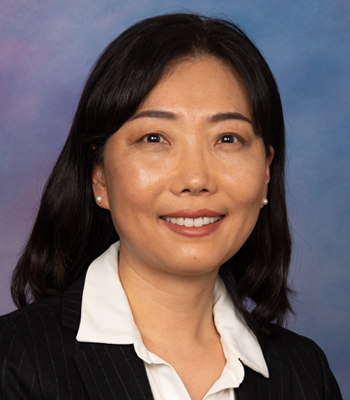HyeonJoo Cheon
Position Title
Assistant Professor
Basic Science
Office Location
Karmanos Cancer Institute
Hudson-Webber Cancer Research Center - 640.1
4100 John R.
Detroit, MI 48201
Mailing Address
Karmanos Cancer Institute
4100 John R., HW06AO
Detroit, MI 48201
Office Phone
313-576-9971
Education Training
Education
(2004) Ph.D. in Biomedical Technology, Korea University, School of Life Sciences and Biotechnology, Seoul, South Korea.
(1996) M.S. in Molecular Biology, Yonsei University, Department of Biology, Seoul, South Korea
(1993) B.S. in Biology, Yonsei University, Department of Biology, Seoul, South Korea
Postgraduate Training
(2009) Cleveland Clinic, Lerner Research Institute, Department of Molecular Genetics, Cleveland, OH
Professional Experience
Faculty Appointments
(2022 - Present) Assistant Professor (Research Educator), Tenure Track, School of Medicine, Department of Oncology, Wayne State University School of Medicine, Detroit, MI
(2013 - 2022) Assistant Professor (Research), Department of Molecular Medicine, Cleveland Clinic Lerner College of Medicine (CCLCM) of Case Western Reserve University (CWRU), Cleveland, OH,
Hospital or Other Professional Appointments
(2015 - 2022) Project Staff, Department of Cancer Biology, Cleveland Clinic, Lerner Research Institute, Cleveland, OH,
(2012 - 2015) Project Staff, Department of Molecular Genetics, Cleveland Clinic, Lerner Research Institute, Cleveland, OH,
(2009 - 2012) Research Associate, Department of Molecular Genetics, Cleveland Clinic, Lerner Research Institute, Cleveland, OH,
(2004 - 2006) Research Instructor, Department of Pathology, Korea University Medical School, Seoul, Korea, South
Major Professional Societies
International Cytokine & Interferon Society (ICIS)
American Association for Cancer Research (AACR)
Courses taught
CB7240 - Principles of Cancer Therapy
CB7410 - Cancer Immunology and Immunotherapy
Research
The Cheon Lab is interested in how cancer cells regulate their own synthesis of type-I interferon (IFN-I) and how they control their responses to IFN-I in the tumor microenvironment. Cancer cell-intrinsic IFN-I synthesis and response impact the effectiveness of radiation therapy, chemotherapy, and immunotherapy. IFN-I contributes to both cell death and survival depending on its strength and duration of stimulation. Acute responses to IFN-I are induced by therapeutic levels of intense DNA damage, leading to cell death through expression of cytotoxic IFN-stimulated genes (ISGs). On the other hand, chronic responses to low levels of IFN-I, induced by repeated exposures to low-level DNA damage, render cells more resistant to DNA damage by inducing pro-survival ISGs, the IFN-related DNA damage resistance signature (IRDS). Some cancer cells constitutively produce and are addicted to their own IFN-I (IFN addiction). They undergo spontaneous apoptosis when their IFN responses are blocked. Interestingly, programmed cell death ligand 1 (PD-L1), often expressed in cancer cells to avoid T cell attack, regulates both sides of IFN-I responses. High levels of PD-L1 inhibit acute cytotoxic IFN-I responses and sustain chronic pro-survival IFN-I responses, protecting cancer cells from DNA damage.
Our current research is focused on: i) determining effective therapeutic strategies that combine DNA damaging agents, IFN-I, and anti-PD-L1 antibodies, which can target cancer cell-intrinsic mechanisms, as well as immune-dependent mechanisms; and ii) elucidating the molecular and cellular mechanisms of how PD-L1 inhibits the JAK-STAT pathway in response to IFN-I, which induces cell killing, and iii) the mechanisms of how PD-L1 facilitates constitutive STING (stimulator of interferon genes) activation that leads to low levels of IFN-I synthesis in cancer cells, inducing chronic pro-survival responses. In the long run, our research will contribute to innovative approaches to treat therapy-resistant tumors using knowledge of IFN-I synthesis and signaling in cancer cells, which has not been previously understood because of the complexity of IFN biology.
Research Interests
The molecular mechanisms and the impact on cancer therapy of:
- Cancer cell-produced type I-interferon/ Interferon addiction of cancer cells
- Cancer cell-intrinsic/ immune-independent function of PD-L1
- Combination therapy using radiation/ chemotherapy and anti-PD-L1
